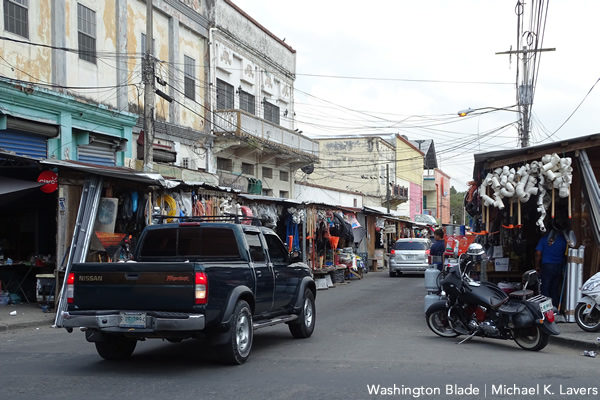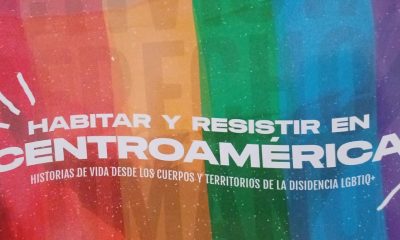U.S. Federal Courts
Federal appeals court rules trans Honduran woman should have received asylum in U.S.
Kelly González Aguilar spent nearly three years in ICE custody

A federal appeals court on Tuesday ruled a transgender woman from Honduras should have received asylum in the U.S. because of “extensive evidence of widespread violence against transgender individuals” in her homeland.
The 10th Circuit Court of Appeals in Denver ruled in favor of Kelly González Aguilar, who is from San Pedro Sula in Honduras’ Cortés department.
González claims her uncle beat her because of her “feminine behavior.”
She fled to Mexico with her sister when she was 12. They tried to find her mother, but the ruling notes González and her sister “suffered further abuse in Mexico, leading them to flee again — this time for the United States.” González transitioned once she arrived in the U.S.
An immigration judge denied González’s asylum claim. She appealed the decision to the Virginia-based Board of Immigration Appeals, which also rejected it.
“Any reasonable adjudicator would be compelled to find a pattern or practice of persecution against transgender women in Honduras,” reads the 10th Circuit ruling.
González spent nearly three years in U.S. Immigration and Customs Enforcement custody until her release from the Aurora Contract Detention Center, a privately-run facility in suburban Denver, on July 14, 2020. González currently lives in the San Francisco Bay Area.
“This is an important decision that recognizes what it is like for people like me in Honduras, and I am happy that other trans people will be able to benefit from my experience,” said González in a press release the National Immigrant Justice Center, which represents her, issued after the 10th Circuit issued its ruling. “Waiting for three years in detention for this decision to come was very hard, but I am proud and grateful for all of the activists, campaign partners and lawyers who helped me along the way. I hope that with this decision they change many laws that violate human rights of LGBTQI immigrants who only ask for refuge.”
Violence and discrimination based on gender identity remains commonplace in Honduras.
Thalía Rodríguez, a prominent trans activist who led Asociación Cozumel Trans, a trans advocacy group, was murdered outside her home in Tegucigalpa, the country’s capital, on Jan. 11. A trans man who was a bus driver in San Pedro Sula fled to the U.S. in February in order to escape persecution and harassment that he and his family suffered because of his gender identity.

The Inter-American Court of Human Rights last June issued a landmark ruling that found the Honduran state responsible for the murder of Vicky Hernández, a trans activist who was killed in San Pedro Sula, the country’s second largest city, after the 2009 coup that ousted then-President Manuel Zelaya.
Zelaya’s wife, Xiomara Castro, took office as Honduras’ first female president on Jan. 26.
Cattrachas, a lesbian feminist human rights group in Tegucigalpa, notes Hernández and Rodríguez are two of the more than 400 LGBTQ people who have been reported killed in Honduras since 2009.
Alma Rosa Silva-Bañuelos, trans asylum advocacy director for the TransLatin@ Coalition, in the press release said the 10th Circuit decision “will save transgender lives.”
“I recall my visits inside detention and weekly phone calls with Kelly while she survived three years in ICE detention,” said Silva-Bañuelos. “Her courage, strength and kindness are part of her resilience, as she waited for her case to be decided she supported other transgender asylum seekers while they were in detention. Kelly became a pillar of strength and support for other trans siblings and with this decision her determination will continue to have a ripple effect for transgender lives.”
Maryland
4th Circuit dismisses lawsuit against Montgomery County schools’ pronoun policy
Substitute teacher Kimberly Polk challenged regulation in 2024

A federal appeals court has ruled Montgomery County Public Schools did not violate a substitute teacher’s constitutional rights when it required her to use students’ preferred pronouns in the classroom.
The 4th U.S. Circuit Court of Appeals in a 2-1 decision it released on Jan. 28 ruled against Kimberly Polk.
The policy states that “all students have the right to be referred to by their identified name and/or pronoun.”
“School staff members should address students by the name and pronoun corresponding to the gender identity that is consistently asserted at school,” it reads. “Students are not required to change their permanent student records as described in the next section (e.g., obtain a court-ordered name and/or new birth certificate) as a prerequisite to being addressed by the name and pronoun that corresponds to their identified name. To the extent possible, and consistent with these guidelines, school personnel will make efforts to maintain the confidentiality of the student’s transgender status.”
The Washington Post reported Polk, who became a substitute teacher in Montgomery County in 2021, in November 2022 requested a “religious accommodation, claiming that the policy went against her ‘sincerely held religious beliefs,’ which are ‘based on her understanding of her Christian religion and the Holy Bible.’”
U.S. District Judge Deborah Boardman in January 2025 dismissed Polk’s lawsuit that she filed in federal court in Beltsville. Polk appealed the decision to the 4th Circuit.
U.S. Federal Courts
Federal judge in Md. rules against White House passport policy
Lambda Legal represents transgender, nonbinary people in lawsuit

A federal judge in Maryland on Tuesday ruled in favor of six transgender people who are challenging the Trump-Vance administration’s passport policy.
President Donald Trump once he took office signed an executive order that banned the State Department from issuing passports with “X” gender markers. A memo the Washington Blade obtained directed State Department personnel to “suspend any application where the applicant is seeking to change their sex marker from that defined in the executive order
pending further guidance.”
The Trump-Vance administration only recognizes two genders: male and female.
The lawsuit that Lambda Legal filed in U.S. District Court for the District of Maryland in Baltimore in April alleges the policy “has caused and is causing grave and immediate harm to transgender people like plaintiffs, in violation of their constitutional rights to equal protection.”
Seven trans people — Zander Schlacter, Jill Tran, Lia Hepler-Mackey, David Doe, Robert Roe, Peter Poe, and Kris Koe — filed the lawsuit.
Roe is a U.S. Foreign Service Officer who currently lives in Europe. Lambda Legal, who represents him and the six other plaintiffs, notes Chief Judge George L. Russell III dismissed Roe’s case because the State Department has yet to deny him “an accurate passport.”
“Like every other court that has considered this executive order, the court finds its stated purpose does not serve an important governmental interest that is exceedingly persuasive; further, the discriminatory means employed are not substantially related to the achievement of those objectives,” said Russell in his ruling.
Lambda Legal Counsel Carl Charles described Russell’s decision as “a crucial victory for our clients and transgender people nationwide who have been trapped by this administration’s cruel and discriminatory policy.”
“The court recognized that forcing inaccurate identity documents on transgender Americans causes immediate and irreparable harm,” said Charles in a press release. “Our clients can now travel with dignity and safety while we continue fighting to overturn this discriminatory policy entirely.”
The American Civil Liberties Union earlier this year filed a separate lawsuit against the passport directive on behalf of seven trans and nonbinary people.
A federal judge in Boston in April issued a preliminary junction against it. A three-judge panel on the 1st U.S. Circuit Court of Appeals last week ruled against the Trump-Vance administration’s motion to delay the move.
U.S. Federal Courts
AGs sue White House over push to restrict gender-affirming care in blue states
14 states, DC joined the lawsuit filed Friday

A group of 15 Democratic attorneys general and Pennsylvania Gov. Josh Shapiro (D) have accused the Trump-Vance administration of unlawfully pressuring health providers to withhold access to gender-affirming medicine for minors in places where these treatments remain legal.
In a complaint filed in the U.S. District Court for the District of Massachusetts on Friday, the attorneys general outlined multiple ways in which, they claim, the administration has overstepped its authority to restrict care that is protected under state law, such as by threatening providers with meritless lawsuits and federal investigations.
On the first day of his second term, President Donald Trump directed the Justice Department to pursue enforcement actions to proscribe medically necessary gender related interventions, which were characterized in his executive order as “chemical and surgical mutilation.”
Thereafter, the DOJ has issued subpoenas, demanded private patient data, and suggested that criminal charges might be coming — actions that have no legal basis, and instead constitute efforts to strong-arm Democratic states into alignment with the administration’s position on gender-affirming care for minors, according to the complaint.
As a result of these pressures, the attorneys general argue, providers have reduced or eliminated services while patients have reported cancelled appointments and uncertainty over whether they can continue receiving treatment.
Their lawsuit asks the court to block the administration’s actions and halt the enforcement of the executive order along with another that prohibits the federal government from recognizing transgender people or acknowledging that gender identity does not always correspond with one’s sex at birth.
The 15 attorneys general are from Massachusetts, California, New York, Connecticut, Illinois, Delaware, D.C., Hawaii, Maine, Maryland, Michigan, Nevada, New Jersey, New Mexico, Rhode Island, and Wisconsin.
-

 Theater5 days ago
Theater5 days agoMagic is happening for Round House’s out stage manager
-

 Baltimore3 days ago
Baltimore3 days ago‘Heated Rivalry’ fandom exposes LGBTQ divide in Baltimore
-

 Real Estate3 days ago
Real Estate3 days agoHome is where the heart is
-

 District of Columbia3 days ago
District of Columbia3 days agoDeon Jones speaks about D.C. Department of Corrections bias lawsuit settlement




















